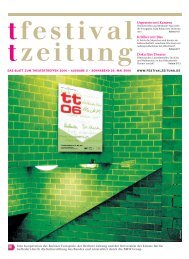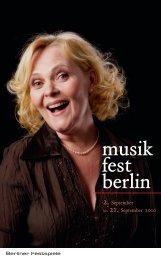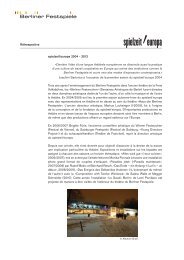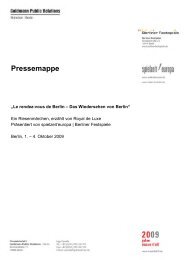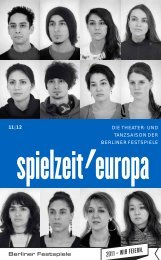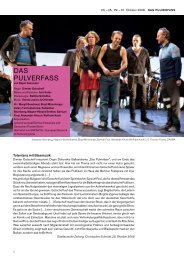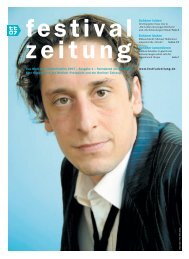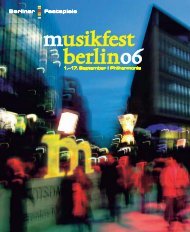Programme of the 9th international literature festival berlin 2009
Programme of the 9th international literature festival berlin 2009
Programme of the 9th international literature festival berlin 2009
You also want an ePaper? Increase the reach of your titles
YUMPU automatically turns print PDFs into web optimized ePapers that Google loves.
Thurs, 17.09. at 8 pm, / Literaturhaus_Kaminraum<br />
Specials<br />
Pier Paolo Pasolini – Who I am, Exhibition opening<br />
Introduction to <strong>the</strong> exhibition: Peter Erismann and Ricarda Gerosa. Film excerpts: Pasolini as a<br />
guest <strong>of</strong> Walter Höllerer’s event series “Optische Literatur” on 12.1.1966 in <strong>the</strong> Berlin<br />
Kongresshalle. Reader: Frank Arnold.<br />
18.09. at-22.11.<strong>2009</strong>. on Tuesday, Wednesday, Friday: 2 pm, -7 pm, Thursday: 2 pm, - 9 pm,<br />
Saturday: 11 am, - 9 pm, Sunday: 11 am, - 7 pm, Admission €5 / €3. Accompanying <strong>the</strong> exhibition<br />
will be a broad programme <strong>of</strong> events with ‘Long Nights’, film screenings, lectures, podium<br />
discussions and musical performances.<br />
Thurs, 17.09. at 8:30 pm, Institut français de Berlin<br />
Kaleidoscope<br />
Mathias Enard (France)<br />
PRESENTER: Barbara Wahlster, SPEAKER: Nina West<br />
The multilingual Candide Prize winner for 2008 studied in Iran, Lebanon, and Egypt, and teaches<br />
Arabic at <strong>the</strong> University <strong>of</strong> Barcelona. The main character in his new novel Zone is also welltravelled.<br />
The mysterious passenger takes a night train from Milan to Rome in order to sell a<br />
briefcase full <strong>of</strong> documents to <strong>the</strong> Vatican. The ageing secret agent looks back on his life like a<br />
modern Odysseus, a life which was closely intertwined with <strong>the</strong> violent history <strong>of</strong> Europe in <strong>the</strong> 20th<br />
century.<br />
Thurs, 17.09. at 8:30 pm, Maxim Gorki Theater / Studio stage<br />
Speak, Memory<br />
Panait Istrati (Brǎila, Romania 1884 − Bucharest 1935)<br />
INTRODUCTION: Marianne Geitel, SPEAKER: Matthias Scherwenikas<br />
Kyra Kyralina, The Thistles <strong>of</strong> Baragan, and more: “Panait Istrati is nei<strong>the</strong>r communist nor<br />
bourgeois, nei<strong>the</strong>r worker nor intellectual […] He is <strong>the</strong> soul that fights for freedom in <strong>the</strong> body <strong>of</strong> a<br />
person” (Nikos Kazantzakis). Born in Rumania, he lived and wrote in France. When his friends<br />
abandoned him, he returned to Romania to die.<br />
Thurs, 17.09. at 9 pm, Haus der Berliner Festspiele / Side Stage<br />
Literatures <strong>of</strong> <strong>the</strong> World<br />
Göran Sonnevi (Sweden)<br />
PRESENTER: Klaus-Jürgen Liedtke<br />
The recipient <strong>of</strong> <strong>the</strong> Nordic Council’s Literature Prize reads from his works Sprache; Werkzeug;<br />
Feuer (t: Language; tool; fire) and Das brennende Haus (t: The burning house), an anthology <strong>of</strong><br />
collected poems. With a songlike flowing style, accomplished without <strong>the</strong> use <strong>of</strong> typical metered<br />
accents, but instead utilizing pauses between halting and flowing phrases, Sonnevi combines<br />
motifs from his comprehensive repertoire <strong>of</strong> <strong>the</strong>mes.<br />
Thurs, 17.09. at 9 pm, Babylon<br />
Specials<br />
Veit Heinichen (Germany)<br />
PRESENTER: Marius Meller<br />
The author believes that crime fiction is an ideal means <strong>of</strong> making <strong>the</strong> workings <strong>of</strong> society<br />
transparent. In his new novel Die Ruhe des Stärkeren (t: The calm <strong>of</strong> <strong>the</strong> strong), he once again<br />
dispatches <strong>the</strong> witty, intractable Commissar Laurenti to <strong>the</strong> border region around his adopted home<br />
town <strong>of</strong> Trieste, where organised crime meets unscrupulous economic leaders. Enriched with black<br />
humour and addresses for gourmets, <strong>the</strong> author’s crime fiction, which has also been adapted for<br />
television, reflects upon <strong>the</strong> political-economic changes in Europe.<br />
4



